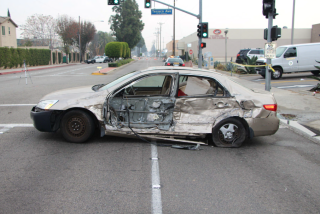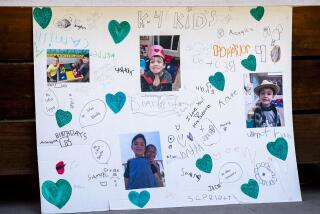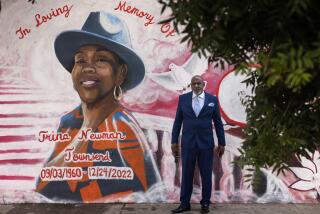A Tragic Childhood Memory Explains Why Seat Belts Are Important
- Share via
I was 12 years old when I learned what “DOA” meant. It was Easter Sunday morning; the sky was such a bright blue it hurt to look up at it. I was playing with friends on the front lawn, when a California Highway Patrol officer drove slowly by.
His presence caused quite a commotion in our placid neighborhood. Kids came running from nowhere and everywhere to follow him, just as though he were driving the ice cream truck.
He had some difficulty locating the address he was looking for. Finally, he turned his engine off, and his car glided to a stop in front of my house.
My house.
The officer who stepped out of the car was a rosy-cheeked, handsome young man. But he moved with the weariness of my Grandpa. He straightened up, carefully removing his glinting reflective sunglasses, and glanced our way. I smiled at him. It was a pretty festive occasion. I felt like a celebrity--after all, he was coming to my house. He looked straight at me, but seemed unable to return my exuberance. He walked through us, straight to my front door.
My Mom must have forgotten to fasten her seat belt that morning, because she was thrown through the windshield of our car. Her neck broken, she was pronounced “DOA” at the emergency ward: Dead on Arrival.
I’m 34 years old now and I am a parent myself. In fanciful daydreams I wonder what life might be like if my Mom had lived long enough to be called Grandma. She could have helped my son pin the corsage on his prom date last week.
Effective Jan. 1, 1986, the California Legislature enacted the Private Passenger Motor Vehicle Safety Act, requiring all drivers and passengers to fasten their seat belts. To me, it is a welcome reminder to exercise care. My Mom was so fastidious about obeying the law, I believe she would have fastened her seat belt that Easter morning if there had been such a law 22 years ago.
I was astonished to learn that many of my friends resent the new law. They claim the Legislature is too “paternalistic.” What right has government got to interfere with our individual autonomy?
Others resent the physical confinement of being “strapped down” by the seat belt. They cherish their freedom of movement and stubbornly resist the efforts of the government’s “Big Brother” tactics.
I became a police officer in my 20s. I can’t describe the sense of helplessness I often felt when arriving at an accident scene. Crumpled bodies would be thrown farther than you could think possible from the cars they rode in, lying still on the asphalt. Sometimes there was little blood, but things wouldn’t look quite right. A limp body might strangely resemble what one might imagine a burlap bag of potatoes would look like after being run over by a truck: the burlap is still serviceable, but things are seriously wrong within.
From one accident, there was so much blood that a normally blase, seasoned veteran of the department became hysterical trying to find the mouth of his accident victim so he could perform CPR to revive him. What must have been the man’s face looked like ground hamburger.
My colleague’s efforts didn’t work.
The man’s wife was uninjured, still securely fastened into the car by a seat belt. He had been among those who felt constrained by a seat belt.
When I could no longer bear the front-line misery of injury accidents, I left police work and went to law school. My primary interest: personal injury law.
I graduated from law school in 1985 and spent my first few months clerking with a small plaintiff’s personal injury firm. Within a few months I switched to the third-largest civil litigation firm in San Diego, Higgs Fletcher and Mack. With a large clientele of insurance companies, often the defendants in personal injury cases, I have gotten exposure to both sides. It opens up new vistas of grief.
Nobody “wins” in personal injury law. You hear of huge multimillion dollar recoveries. Many of those recipient victims are so egregiously and permanently injured that they will never even realize they received an award. I’m sure each one of them would gladly trade every single dollar of their recovery monies to be the person they were before the accident.
Insurance companies continually raise their premiums in response to the outflow of hard cash. We all pay.
I agree that the Legislature is behaving paternalistically. This is an area where it is justified. We are all affected by deaths on our highways and streets. Reports of significant reductions in death and serious injuries are already pouring in. Accident injury experts speculate that it is the new seat belt law in effect.
San Diego Police Officer Eddie Ortiz keeps track of traffic statistics for the city. In the first quarter of 1986, after passage of the seat belt law, accident injuries decreased 7.6%, from 1,650 the same quarter the year before to 1,524.
From the economic standpoint alone, the cost of providing police, paramedic and ambulance assistance is crippling our municipalities. Insurance premiums are crippling us financially. It stands to reason that the less serious the injuries, the less cost to provide personnel to deal with it and insurance to cover costs. Your not fastening your own seat belt costs me and the other taxpayers money. The human grief is immeasurable in terms of dollars. We are all affected.
Recall John Donne’s words:
“Any man’s death diminishes me, because I am involved in mankind; and therefore never send to know for whom the bell tolls; it tolls for thee.”
I missed my Mom again this Easter.
Memorial Day has just passed, and the Fourth of July--which each year sees legions of deaths due to accidents--is rapidly approaching. The Memorial Day accident figures are cause for hope. Ortiz reports that injury accidents were down from 97 last year to 83 this year. Asked whether he believes the seat belt law made the difference, he replied, “Definitely.”
Please fasten your seat belt today so you will get home safely to share this lovely evening and many more with your family. Years from now, your children won’t have to wonder what it would have been like if . . .
More to Read
Sign up for Essential California
The most important California stories and recommendations in your inbox every morning.
You may occasionally receive promotional content from the Los Angeles Times.













